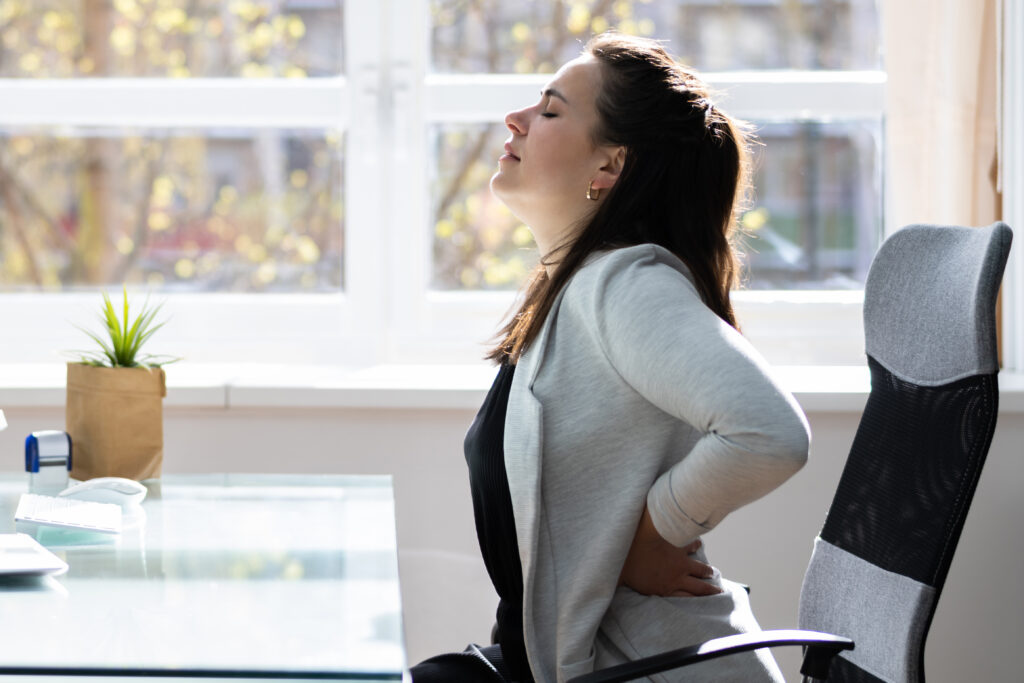Your Posture and Your Pelvic Health
Posted By:

Dr. Michael Coyle, DO FACOOG, FPMRS

Poor Posture Hurts Your Pelvic Floor
The health of your pelvic floor may depend on your feet. And your shoulders. And your neck.
Having poor posture, from slumped shoulders to tilted pelvis, can have a negative effect on the health of your pelvic floor – the sling of muscles that bear the weight of your internal organs when you sit or stand. How we sit, stand and go about our daily routines can affect pelvic floor strength and necessary flexibility.
Good posture strengthens core muscles, gives you room to breathe and stretches everything to exactly where it needs to be for optimal health. Bad posture? It’s not good for any part of your body.
Are you guilty of any of these posture problems?
Don’t Slouch!
Did you read that in your mother’s voice? How about, “Stand up straight!”
It turns out she knew what she was talking about.
When we sit in a slumped posture, our pelvic floor muscles aren’t getting the workout they get when we sit up straight. Your pelvic floor gets lazy from just sitting there doing nothing. That’s because slouching in a chair decreases the activity of your transverse abdominal muscles, which work with the pelvic floor muscles in providing bladder control .
While standing, women with slumped postures often suck in their stomachs to appear thinner and taller. Sucking it in causes you to take more shallow breaths, constricting the diaphragm’s full range of motion. Believe it or not, your diaphragm and pelvic floor work together to keep all of your organs in check. When the diaphragm isn’t moving, the pelvic floor is also slacking and getting no exercise, stretching or tone.
Pelvic Position
One of the biggest culprits causing bad posture is forward pelvis tilt, when the pelvis tips way forward while a person is in a relaxed stance, causing a sway back. A sway back is when your back arches too much, placing the hamstrings in an over-lengthened position, which can make them feel tight.
Forward pelvis tilt not only tightens hamstrings, but it also leaves your glutes underworked!
Meanwhile, inside the pelvis, the muscles and ligaments of the pelvic floor are not experiencing a full range of motion, leaving them tight and weak, which can lead to incontinence and even vaginal or bladder prolapse.
Forward tilt is not uncommon. It can be the result of sitting too much and not stretching, which shortens the muscles between the hip and the knee.
Know your options and live the life you want.
Schedule an Appointment TodayGet Loose
Contrary to what you may think, clenching your glutes while standing for long periods of time can make them weaker. This, in turn, makes it harder for your pelvic floor contract. Clenching your glutes will often make you clench your pelvic floor as well, which makes it ineffective at dealing with stresses, such as bladder control.
Some people have pelvic floors that are tight all the time. Great, right? Nope. If a muscle cannot relax or lengthen properly, it cannot properly contract. Extending, stretching and contracting all have to happen for the pelvic floor to stay in shape and do its job.
How to Stand Up Straight
- Don’t tip back on your heels. Your weight should mostly rest on the balls of your feet
- Don’t lock your knees. Keep them relaxed and slightly bent
- Place your feet about shoulder-width apart
- Pull your shoulders slightly backward
- Don’t exaggerate pulling back your shoulders or “straightening” your spine. You should appear relaxed
- Your earlobes should be in line with your shoulders. (Because many of us stare at screens all day our heads are pushed forward. Have someone check your ear/shoulder alignment)

How to Sit
- Keep your feet on the floor or use a low footrest
- Don’t cross your legs. Crossing at the knee or ankle can create asymmetrical stress – and varicose veins
- Align your ankles directly in front of your knees, not splayed out or tilted in
- Adjust your chair so your knees are at or below your hips
- Use a use a back support if needed
- Relax your shoulders
- Get up to walk around or stretch at regular intervals. It’s good for your eyes and mental health, too
Your urogynecologist at the Coyle Institute can assess your pelvic floor and help you create a program that can improve pelvic floor health and strength. A strong pelvic floor can help prevent incontinence, organ prolapse and other pelvic health issues.
Call us for a consultation today and feel better head to toe!
